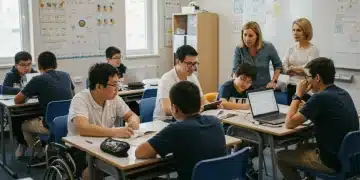Scene special education law: Understanding the nuances

Scene special education law ensures that students with disabilities receive necessary services, promoting individualized support and inclusion in educational settings through tailored plans like IEPs.
Scene special education law plays a vital role in ensuring that students with disabilities receive the support they need. Are you familiar with its implications for educational settings? Let’s explore this together.
Defining scene special education law
Understanding scene special education law is essential in providing adequate support for children with disabilities. This law ensures that students receive the services they need to thrive in educational settings.
What is scene special education law?
The scene special education law includes regulations that govern how schools must address the needs of students with disabilities. It aims to create equal educational opportunities for all learners. This framework is crucial for designing individualized education programs (IEPs).
Key components of the law
- Ensures free appropriate public education (FAPE) for students
- Promotes the development of IEPs tailored to individual student needs
- Mandates that schools involve parents in the decision-making process
- Requires schools to provide necessary accommodations and modifications
Schools must also ensure that students are placed in the least restrictive environment (LRE). This means students with disabilities should learn alongside their peers without disabilities whenever possible. By integrating different learning strategies, educators create a more inclusive atmosphere.
Teachers and staff must understand the requirements of scene special education law to implement effective strategies. Training and resources can help educators keep up with these standards. When teachers are well-informed, they can better advocate for their students.
Importance of awareness
Awareness of scene special education law is key for parents and educators alike. Knowing the rights and resources available can significantly impact a child’s education. It empowers families to seek help when needed, ensuring that each child receives appropriate support.
Key principles of special education rights
The key principles of special education rights serve as the foundation for ensuring that students with disabilities have equal access to education. Understanding these principles is crucial for parents, educators, and advocates.
Free Appropriate Public Education (FAPE)
One of the core tenets is the guarantee of a free appropriate public education. This means that schools must provide services tailored to each child’s unique needs without charging families.
Individualized Education Program (IEP)
Another essential aspect is the Individualized Education Program (IEP). An IEP outlines specific educational goals and the services a student will receive. It is developed collaboratively by educators, parents, and specialists.
- IEPs are designed to meet the individual needs of each student.
- They must be reviewed and updated regularly.
- Parents have a vital role in IEP meetings.
- IEPs should promote better learning outcomes.
Additionally, students have the right to be placed in the least restrictive environment (LRE). This principle emphasizes including students with disabilities in general education classrooms whenever possible. By doing this, students can learn alongside their peers and participate in a broader social environment.
Moreover, schools are required to work collaboratively with families. This partnership ensures that parents are involved in decision-making processes and understand their child’s educational rights. Open communication between schools and families helps create a supportive learning atmosphere.
Non-discrimination
Lastly, non-discrimination is a critical principle. Schools cannot discriminate against students based on their disabilities. All students must be provided with equal opportunities to succeed and thrive in their educational journey.
Navigating the process for special services

When navigating the process for special services, it’s essential to understand the steps involved. This journey can be complex, but knowing what to expect can help families feel more empowered.
Starting the process
The first step is identifying your child’s needs. Parents may notice challenges that affect learning and behavior. It’s important to document these observations and share them with teachers or school staff.
Requesting an evaluation
If concerns persist, the next step is to request a formal evaluation from the school. This evaluation assesses whether the child qualifies for special education services. Parents have the right to initiate this request, and schools are legally required to respond.
- Gather relevant information about your child’s performance.
- Submit a written request for evaluation to the school.
- Follow up to ensure the evaluation process begins.
- Stay informed about the timeline for assessments.
Once the evaluation is complete, the results will determine eligibility for services. If your child qualifies, a meeting will be scheduled to develop a Individualized Education Program (IEP). In this meeting, parents, teachers, and specialists work together to define goals and support strategies tailored to the child’s needs.
Understanding IEP meetings
During IEP meetings, it’s crucial for parents to be actively involved. They should feel free to ask questions and express any concerns. The IEP will outline specific educational goals, accommodations, and services. Regular reviews of the IEP are important, as they allow for adjustments based on the child’s progress.
Throughout the entire process, keeping open lines of communication with teachers and specialists is vital. Regular updates and meetings can help ensure that the child’s needs continue to be met effectively.
Common challenges in special education law
There are many common challenges in special education law that families and educators face. Understanding these issues can help in navigating the complexities of securing services for children with disabilities.
Limited resources
One major challenge is the availability of resources. Schools often operate under budget constraints, which can limit the services and supports provided to students. This can lead to inadequate support for children who need it most.
Misunderstanding of rights
Another common issue is the misunderstanding of rights related to special education. Many parents may not be fully aware of their child’s rights under the law, such as the right to a free appropriate public education (FAPE). This lack of knowledge can hinder their ability to advocate effectively for their children.
- Parents may struggle to find information about special education laws.
- They might not know how to initiate evaluations or request services.
- Many feel overwhelmed during the IEP process and require guidance.
Additionally, communication barriers can arise between parents and educators. Parents may feel that their concerns are not being heard, while educators might struggle to understand parental insights about their child. Establishing a collaborative relationship is essential for overcoming this hurdle.
Inconsistent implementation
Another significant challenge is the inconsistent implementation of special education laws across different schools and districts. Variations in policy application can lead to unequal access to services for students with disabilities. Families in different locations may experience vastly different levels of support.
Moreover, it’s important for families to keep detailed records of communications and services provided. Keeping a log of meetings, evaluations, and IEP documents can be beneficial. It serves as a valuable tool in case parents need to advocate for additional support or clarification regarding their child’s education.
Impact of scene special education law on students
The impact of scene special education law on students is both profound and far-reaching. This law plays a crucial role in ensuring that students with disabilities receive the support and services they need to succeed in school.
Ensuring access to education
One of the primary impacts is the guarantee of access to free appropriate public education (FAPE). This ensures that students with disabilities can attend school and participate in educational programs alongside their peers.
Individualized support
Through the establishment of Individualized Education Programs (IEPs), the law provides students with tailored educational plans. These plans are specifically designed to meet each student’s unique needs. Support can include specialized instruction, accommodations, and related services.
- Students receive personalized goals based on their strengths and challenges.
- Teachers implement specific strategies to help students learn effectively.
- Regular evaluations track progress and assess the need for adjustments.
- Collaboration between parents and educators ensures continuity of support.
Furthermore, the law promotes a more inclusive learning environment. Students are educated in the least restrictive environment (LRE), allowing them to learn alongside their non-disabled peers. This inclusion fosters social relationships and improves overall school experiences for students with disabilities.
Building confidence and skills
Another significant impact is the development of confidence and self-advocacy skills among students. With appropriate support, students learn to express their needs and advocate for themselves. This empowerment can lead to improved academic performance and emotional well-being.
Additionally, the law ensures that students receive necessary transitions services, preparing them for life after school. From job training to college counseling, these services equip students with the tools they need to navigate their futures successfully.
FAQ – Frequently Asked Questions about Special Education Law
What is scene special education law?
Scene special education law ensures that students with disabilities receive the support and services they need to succeed in their education.
How does an Individualized Education Program (IEP) work?
An IEP is a tailored plan developed for each student with disabilities, outlining specific educational goals and the supports they will receive.
What challenges can families face in accessing special education services?
Families may encounter limited resources, misunderstandings about rights, and communication barriers with educators.
What is the role of parents in the special education process?
Parents play a vital role in advocating for their child, participating in IEP meetings, and collaborating with teachers to ensure appropriate support.





